
Since the beginning, the face and voice of the Sex Pistols has been John Lydon, aka Johnny Rotten. Beyond that, the imagery associated with the band mostly stems from the drugged-out, bass-slung-low antics of Sid Vicious.
But Lydon only wrote the lyrics and Vicious could hardly play bass. And none of it would have been possible without Glen Matlock, the Pistols’ original bassist and (depending on when and who you ask) chief songwriter.
Regardless of who wrote and played on what, songs like Anarchy in the U.K., God Save the Queen and No Fun became classics. What’s more, Vicious is dead and Lydon isn’t fronting the Pistols for their latest reunion. Instead, former Gallows frontman Frank Carter is out front.
What does Matlock think of all this?
“We’re celebrating,” he says. “Everybody wants to hear the Sex Pistols thing, so we might as well give it to them.”
But this is a new animal compared to past Pistols parties, as Carter isn’t bothering to do his best Johnny Rotten impression. “What we’re making now is a glorious racket,” Matlock says. “We’re not trying to relive those songs, but we’re playing those songs in the spirit that they were kind of written musically.”
Matlock doesn’t know what the future holds beyond the “never say never” mentality. For now – and perhaps for the first time – he’s happy just to be out there repping punk rock as only a Pistol can. And there’s no denying that Carter is a big part of that.
“Frank brings his own thing to the band, which is joyous,” Matlock says. “He respects the songs and the sentiments behind them, and he sings them in his own way.”
What kicked off this current iteration of the Sex Pistols?
“It sort of evolved organically. That’s not very punk, is it? [Laughs] We were thinking about doing it, and my son, Louie, suggested Frank. I met up with him, introduced him to Paul and we had a little play. And Steve was in L.A., and he came over, and we started rehearsing. That was it.”

Just like that, you’d replaced one of the most irreplaceable frontmen in history.
“It was like falling off a log, really. You know, I was aware of Frank a little bit. I went to see the Rattlesnakes play. They did two sold-out shows at the Roundhouse in London, and I was impressed. They’ve got a lot of presence.”
Frank gets what the Pistols are all about, and he’s not trying to replace John.
“Frank gets it. He’s not a po-faced, miserable git. He’s got a sense of humor. He’s got a twinkle in his eye, you know? You’re playing away, and he’ll come up to you in the middle of Steve doing a guitar solo, and he’ll pull sort of a funny face and make you laugh. That didn’t always happen before, so it’s kind of cool.”
A lot of the lore surrounding the Pistols stems from John’s cantankerous nature and Sid Vicious’s outlandish persona. After you left the band, was it tough to watch from the sidelines, considering you’d been so integral to building the band and writing or co-writing many songs?
“There’s a TV show over here [the U.K.] called The Fast Show; it’s like all kinds of little skits. So, there’s two, like, English, working-class blokes sitting in a bar, you know, complaining about things, and one says to the other, ‘If that’s what you want, that’s what’s going to happen,’ you know, because it’s all going tits up.
“That’s what I thought. So, if they get him [Sid Vicious], if that’s what they want, well, that’s what will happen. And it kind of did, you know. That’s a shame.”
Considering you were the most accomplished musician in the band in the early days, and Sid literally couldn’t play bass, what did you think of him replacing you?
“I kind of didn’t dislike Sid. I thought he had something going for him as a singer, not as a musician. But he was kind of a bit like Elvis [Presley] in the way that he would be quite good at singing somebody else’s song but not necessarily come up with anything himself, you know? So there you go.”
It didn’t hurt that you kept busy after leaving the Pistols.
“As soon as I left the band, I was doing my own band, a band called Rich Kids. We had our moment in the sun over here. And then I ended up playing with Iggy Pop straight after that, so I’ve always been busy. Fortunately, the phone rings, you know? [Laughs]”
As soon as I left the band, I was doing my own band, a band called Rich Kids. We had our moment in the sun over here
You reunited with the Lydon-fronted Pistols in 1996 and the 2000s. Steve alluded to not always feeling happy during those years, but it’s different now with Frank. Do you share those sentiments?
“Yeah, I can. I think that it’s a totally different thing. Some people have different takes on things as they go through life. We just go and play our music, you know? It’s as simple as that. The people like it; it’s great. It’s not the original band, but it’s pretty close to it.”
How do you view the band’s legacy?
“I think it’s good that we’re always up there in the top 100 songs of all time. I think that’s because they’re pretty catchy in a cool way. And I think that was my contribution. I think I gave John a vehicle for his off-the-wall lyrics.”
- This article first appeared in Guitar World. Subscribe and save.







